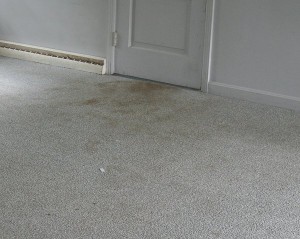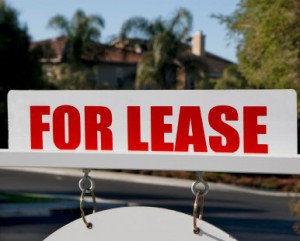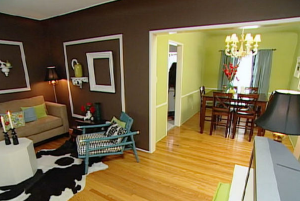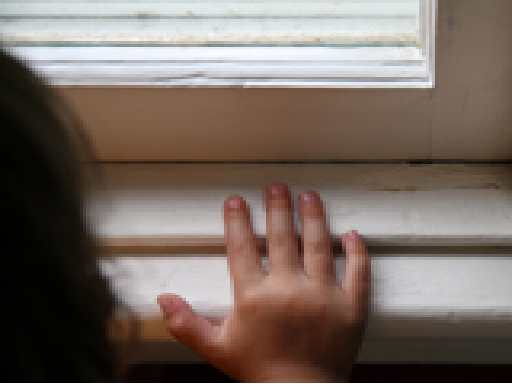Posted by Teresa on June 28, 2012 under Landlord Tips, Rents and Deposits | 
 When tenants move out, it’s standard practice to conduct a walk-through of the rental property, checking for damages. Then, all necessary repairs are made, with the cost typically taken out of the tenant’s security deposit. It’s generally understood that tenants are not responsible for any ordinary wear and tear—this is a cost of doing business, covered by the property owner.
When tenants move out, it’s standard practice to conduct a walk-through of the rental property, checking for damages. Then, all necessary repairs are made, with the cost typically taken out of the tenant’s security deposit. It’s generally understood that tenants are not responsible for any ordinary wear and tear—this is a cost of doing business, covered by the property owner.
The standard definition of “ordinary wear and tear” in most states is deterioration or damage to the property expected to occur with normal usage. However, it’s often a judgment call. What about crayon marks, carpet damages or nail holes?
Ordinary wear and tear generally applies to items like flooring, paint and woodwork. For example, carpeting has a set useful life. If carpet needs to be replaced after a tenant lives in your rental property for five years, that’s likely going to fall under “ordinary wear and tear.” However, a one-year tenant who damages brand-new carpet would be liable for those damages.
Minor indentations on walls are normal; crayon marks, nail holes and gouges are not. Cracks in old tile are normal; broken and chipped new tiles are beyond normal wear and tear. If a tenant breaks a refrigerator drawer or the knobs on the stove, it’s considered damage, not normal wear and tear. Damage from a pet chewing on baseboards is certainly not normal.
Tenants must also return the property to the condition it was in when they moved in. If a tenant leaves dirt and grime behind, the landlord may have the rental unit cleaned and deduct the fee from the security deposit.
Be sure to be thorough and specific when noting damages on your move-out inspection sheet. Take photos or videos and send tenants a detailed list of any charges. Keep all receipts for cleaning, repairs or replacement.
Posted by Teresa on June 26, 2012 under Housing Trends | 
 When the economy is still sputtering and jobs are still hard to come by, average Americans are seeing their homes lose value and rents going up. But that happens to the super rich, too. In fact, the number of homes with rents that top six figures is rising. Demand is high and supply is short in the “trophy home” market, with tenants who are willing to pay each month what many of us would like to earn in a year.
When the economy is still sputtering and jobs are still hard to come by, average Americans are seeing their homes lose value and rents going up. But that happens to the super rich, too. In fact, the number of homes with rents that top six figures is rising. Demand is high and supply is short in the “trophy home” market, with tenants who are willing to pay each month what many of us would like to earn in a year.
For example, in Manhattan, the wealthy can rent an apartment where composer Cole Porter once lived. It has five bedrooms and five and a half baths, and rents for $150,000 per month. It’s located in the Waldorf Hotel, so tenants also get twice-a-day maid service. Another suite on the same floor rents for just $135,000—a savings of $15,000! per month
On the West Coast, several Beverly Hills homes fit into the $100K and over category. One boasts a disco and tennis court and goes for $195,000 per month. Beverly Hills is popular with actors and musicians who are in town for short periods of time and want luxurious mansions.
Brokers who work with the tenants who can afford these rentals say their clients are often celebrities like Beyoncé, foreigners, such as Saudi royalty, or entrepreneurs who need short-term housing. They want security and privacy, along with room for their staff of chefs, nannies, personal trainers and chauffeurs.
Other mega-rich tenants have a lot in common with an increasing number of “average” renters—they simply want flexibility in their housing. Rather than owning a home that may or may not sell when they’re ready to move, renting offers them the ability to move without hassle whenever they want—to a place like the Malibu beachfront home owned by actor Leonardo DiCaprio, with a $150,000 monthly rent.
No matter how rich your prospective tenant is, you need to protect your rental property and assets with tenant background checks. Proper tenant screening will ensure you are leasing to the best possible tenants.
Posted by Teresa on June 24, 2012 under Eviction, Fair Housing Act, Landlord Tips | 
 If you’re thinking about investing in rental property, particularly as demand for rentals is increasing and housing prices are at the low point in many markets, there is a lot you’ll need to learn. Some aspects of landlording can only be learned through experience, but others are important to understand from the very beginning, to ensure you’re in compliance with property and tenant regulations.
If you’re thinking about investing in rental property, particularly as demand for rentals is increasing and housing prices are at the low point in many markets, there is a lot you’ll need to learn. Some aspects of landlording can only be learned through experience, but others are important to understand from the very beginning, to ensure you’re in compliance with property and tenant regulations.
Even if you’ve been a landlord in the past, you’ll need to brush up on new laws. For example, in many states, certain disclosures are required to protect tenant health. You may be required to reveal exposure to floods, mold or radon. Some states require indoor air tests or other environmental testing. Federal laws require landlords to disclose lead-based paint hazards in buildings built prior to 1978. You may be required to provide smoke detectors, carbon monoxide detectors, or both.
The federal Fair Housing Act prohibits discrimination in renting property based on a person’s race, color, religion, national origin, gender, marital status or disability. Landlords may not prohibit children in rental property, unless it is a senior-only community.
Landlords are required to provide safe and habitable units for tenants, according to local and state housing and health codes. All utilities must be operational. Necessary repairs must be made promptly. Lighting, locks and grounds should be maintained to prevent crime and injuries. Landlords cannot force tenants to move by turning off heat, lights, or water, by changing locks or removing the tenant’s property. Check local statutes for the guidelines and proper process for evicting tenants.
In many states, security deposits are strictly regulated, including the amount that may be charged, where the funds are kept (such as in a separate bank account from rents or in an interest-earning account) and how they are disbursed to former tenants. You may also be limited as to what the security deposit can cover. Some states allow deposits to cover unpaid rent, while others limit their use to just damages. Landlords may be required to refund a security deposit in a certain number of days.
The proper handling of a tenant’s property is another potentially sticky area. When a tenant leaves property behind, you may be required to prepare an inventory and have a law enforcement officer sign off on it. Depending on where you live, a landlord may be prohibited from moving a tenant’s property off the premises; or they may be allowed to dispose of it after a set period of time. Check your local laws to ensure compliance.
Becoming a landlord can be a profitable venture. Just be sure you’re in compliance with local, state and federal laws, or you may have legal fees that can wipe out your potential gain.
Posted by Teresa on June 19, 2012 under Housing Trends, Landlord Tips | 
 What type of tenant are you trying to attract? Higher-end, luxury-loving people who demand the best? Outdoor types? Young families or professional singles? While the Fair Housing Act makes it illegal to discriminate against any group based on race, religion, family status and other factors, that doesn’t mean you can’t make your rental property stand out from the crowd so that your target market wants to live there.
What type of tenant are you trying to attract? Higher-end, luxury-loving people who demand the best? Outdoor types? Young families or professional singles? While the Fair Housing Act makes it illegal to discriminate against any group based on race, religion, family status and other factors, that doesn’t mean you can’t make your rental property stand out from the crowd so that your target market wants to live there.
For example, if your property is conducive to families with children, with playgrounds and three-bedroom units, you may not see as many single renters applying for leases. On the other hand, if you want to attract professionals (single or otherwise), you’ll want to provide amenities that they prefer, such as high-speed wireless Internet, online rent payment and maintenance requests, and flexible pet policies. They also may be looking for a little more character than a typical apartment offers. Features like hardwood floors, bright spaces, exposed brick and rafters, stylish appliances and modern lighting go a long way to attracting this crowd. Young professionals like to live in hip, cool—but not necessarily luxurious—spaces.
Obviously, if you want to attract a higher-end tenant, you’ll need to invest in luxury touches, such as marble in the bathrooms, quality fixtures, swimming pools, fireplaces, workout centers and beautiful landscaping. Give them plenty of room to park their cars, and storage for their skis, bikes, and other outdoor toys. Then respond to their requests for maintenance or other services as quickly as possible.
Think about whom you want to attract to your rental properties. Then think about what they want. Deliver it, and you could see vacancy rates dropping, and rents increasing.
Posted by Teresa on June 8, 2012 under Lease and Rental Agreements, Legal | 
 A Brooklyn landlord obtained a restraining order against a tenant who has been renting out his apartment by the night through Airbnb, the site that connects travelers with homeowners or tenants who have rooms, homes or apartments to rent.
A Brooklyn landlord obtained a restraining order against a tenant who has been renting out his apartment by the night through Airbnb, the site that connects travelers with homeowners or tenants who have rooms, homes or apartments to rent.
By turning his apartment into a full-time hotel room, the tenant made nearly $20,000 in nine months. He regularly grossed $1,000 per month over the cost of his rent by inviting unscreened, unapproved guests from all over the world to stay in his apartment.
Not any more. The landlord was well within his rights to use the court system to stop the tenant from endangering his business through running his own business out of the apartment, which is not only an illegitimate use of the rental property, but could lead to all sorts of problems.
Landlord’s insurance would not likely cover incidents that can occur when hundreds of strangers inhabit a property in a given year—while the chance of accidents, thefts, property damage and fire increase. There is simply much greater risk to the insurance company and the landlord when a property is used as a hotel.
Rentals are typically not allowed to be commercial enterprises, such as clothing boutiques, restaurants, bakeries or doggie day cares, so why would a tenant believe it’s okay to make money and put the landlord at risk by running a hotel?
The funny twist to the story is that the landlord has started renting empty units himself on Airbnb.
Landlords, remember to be specific in your leases about which activities are and are not allowed in your rentals. If you do not allow roommates without your approval, or subletting without your approval, you should add that you do not allow tenants to have paying guests by the night, by the week, or at all without your approval. Check with your attorney for proper language to protect your interests.
Posted by Teresa on June 7, 2012 under Legal | 
 Despite repeated warnings, a Baltimore landlord kept violating lead-paint regulations for decades. He has now been sentenced to a year and a day in prison.
Despite repeated warnings, a Baltimore landlord kept violating lead-paint regulations for decades. He has now been sentenced to a year and a day in prison.
Cephus Murrell owned 175 rental units, all built before lead paint was banned for its dangers, especially to children. Since 1974, he has been issued more than 20 violation notices and compliance orders. More alarming is that a city Health Department inspector testified at his sentencing hearing that children in at least 11 of Murrell’s properties have tested positive for lead poisoning over the last 30 years.
The jail sentence was imposed for three misdemeanor violations of the Toxic Substances Control Act. Murrell pleaded guilty to the charges, including failing to notify tenants of lead-based paint hazards, potentially exposing children to lead dust by conducting an abatement while they were present, and falsely certifying that abatement work was being properly supervised.
Under Title X, or the Residential Lead-Based paint Hazard Reduction Act, landlords are required to disclose any known lead-based paint or hazards in their rental property before signing or renewing a lease with a tenant.
Under a federal plea from last year, Murrell was required to obtain certificates of reduced lead-based paint risks at 60 properties. To date, he has submitted only 11 certificates, according to the Maryland Department of the Environment.
The judge also ordered Murrell to get out of the rental housing business. His attorney indicated that he had turned over his properties to a trustee after filing for bankruptcy in March.
The law was enacted in 1992 to reduce the health threats of lead-based paint to adults and children. When lead-based paint peels, chips or is sanded, it can lead to lead poisoning, which affects nearly every system in the body. Infants and young children are particularly susceptible. Lead poisoning can lead to behavior problems, impaired growth and reading and learning problems. The Centers for Disease Control (CDC) estimates 250,000 U.S. children ages one through five have elevated blood lead levels.
It’s a landlord’s responsibility to follow the law, notify tenants of hazards, and take care of lead-based paint issues. So many children are affected for life by negligence like that shown in this case.
Posted by Teresa on June 1, 2012 under Lease and Rental Agreements, Legal | 
 More rental property owners are prohibiting smoking in their buildings. The reasons to do so are many: avoiding the smell and stains that permeate your property, lowering the risk of fire, and protecting the health of children and non-smoking tenants. Plus, a number of municipalities are passing no-smoking laws for multi-family or public housing buildings.
More rental property owners are prohibiting smoking in their buildings. The reasons to do so are many: avoiding the smell and stains that permeate your property, lowering the risk of fire, and protecting the health of children and non-smoking tenants. Plus, a number of municipalities are passing no-smoking laws for multi-family or public housing buildings.
However, smoking is not illegal. While you may have decided to prohibit smoking inside your rental units, can you deny the lease applications of smokers? And what can you do if you find out after the fact that someone was smoking in your smoke-free property?
First of all, smokers are not a protected class. The Fair Housing Act does prohibit housing discrimination against people based on religion, sex, disability, race, color, national origin, and family status. But it doesn’t deny landlords the right to choose tenants based on their smoking status.
To prevent smokers from taking advantage of lease loopholes, such as smoking outside their units, you might consider strengthening your lease language to prohibit smoking anywhere on the property. Since you are the owner and it is private property, you have the right to prohibit smoking wherever you’d like.
Being a hands-on landlord can help you avoid the problem of hidden smokers. When walking through your property, you may notice cigarette butts, or smell smoke. Asking tenants if they’ve noticed any smoking will indicate that you care about their health and enforcing the terms of your lease. If you do find out someone has broken the lease by smoking, you could have grounds for eviction (check with a landlord/tenant attorney for advice).
While frequent inspections can flush out smokers, many landlords don’t see the inside of their units until a tenant has moved out. If you discover signs of smoking, such as odor, cigarette burns or a layer of tar on walls and ceilings, you are likely entitled to withhold clean up costs from the tenant’s security deposit. Track all expenses (cleaners, primer, paint, new flooring) and keep receipts. Of course, it’s best to conduct a move-out inspection with the tenant so he or she can acknowledge all damages.
Protect your rental property and assets through tenant background checks. Proper tenant screening will ensure you are leasing to the best possible tenants.
 When tenants move out, it’s standard practice to conduct a walk-through of the rental property, checking for damages. Then, all necessary repairs are made, with the cost typically taken out of the tenant’s security deposit. It’s generally understood that tenants are not responsible for any ordinary wear and tear—this is a cost of doing business, covered by the property owner.
When tenants move out, it’s standard practice to conduct a walk-through of the rental property, checking for damages. Then, all necessary repairs are made, with the cost typically taken out of the tenant’s security deposit. It’s generally understood that tenants are not responsible for any ordinary wear and tear—this is a cost of doing business, covered by the property owner.





